If you live with the daily struggles of diabetes, you know how stressful lowering blood sugar levels can be. You also know how one bad decision… one tempting chocolate truffle… can lead to the all too common symptoms of this challenging and isolating disease – fatigue, dizziness, confusion, shaking, irritability, hunger, and weakness.
- Remember, before self-diagnosing yourself with diabetes, it’s essential to talk about your symptoms with a doctor.
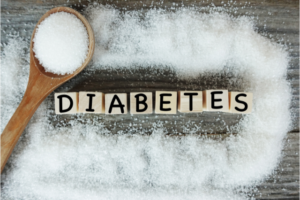
When one has diabetes, monitoring your blood sugar levels has to get done daily, if not multiple times a day. If your blood sugar levels are still high after cutting down on carbs and getting more exercise, please don’t be discouraged.
Adjusting your diet and maintaining a healthy weight are natural ways to lower your risk of developing complications due to diabetes such as heart disease, foot problems, kidney disease, or eye problems.
10 Ways to Lowering Blood Sugar Levels Naturally
Here are ten different ways to lower your blood sugar naturally to strengthen your awareness and be in a much healthier place.
1. Eat Whole Grains
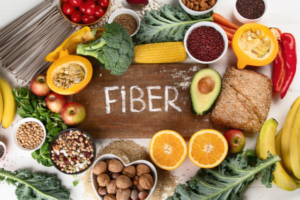
Eating whole grains is an excellent idea if you have diabetes because they will help you maintain a healthy weight and improve insulin sensitivity, which means it will be easier to control your blood sugar levels.
A study from Harvard School of Public Health found that people who eat three servings of whole grains per day lowered their body weight by five pounds over one year.
High-fiber diets also help promote healthy gut bacteria, which can help reduce inflammation in your digestive tract and lower your blood glucose levels.
2. Foods With Cinnamon
Foods that contain cinnamon are helpful for blood sugar management, as the spice has properties that help manage blood sugar levels. Cinnamon can also help reduce cravings for sweet food, which is good if you’re trying to maintain a strict regimen of cutting back on sugar.
3. Green Tea

If you’re on a low-calorie diet and notice that you still have high blood sugar levels, it could be because you’re not drinking enough fluids. Drinking plenty of fluids is vital for everyone, but it’s crucial if you have diabetes.
Green tea also has a lot of antioxidants, which help fight against inflammation and chronic diseases. In one study with women who had type 2 diabetes, those who drank green tea had lower blood sugar numbers than those who didn’t drink green tea.
4. Apples
Apples are a great food to lower blood glucose levels. They contain a low amount of natural sugars, and the fiber helps regulate your digestive system. If you have diabetes, you should eat them without adding any sugar or other sweetener.
5. Honey
Honey is a natural sweetener that has many health benefits. One of these benefits is that it can help lower your elevated blood sugar levels. This effect is due to the fructose found in honey, which is absorbed more slowly by the body than other types of sugar.
6. Lemon Juice
One of the best foods to lower blood sugar is lemons. Lemons contain many citric acids, which may help with lowering your blood sugar levels. When you juice a lemon or drink a glass of water with a squeezed lemon wedge, you can significantly reduce the amount of sugar in your blood.
7. Seaweed
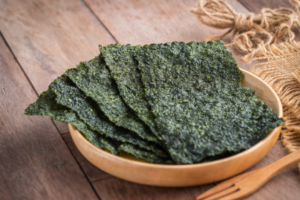
Seaweed is an excellent choice for people trying to lower their blood glucose levels. Seaweed contains a type of natural sugar called fucitol. Fucitol can modulate the body’s insulin resistance in both diabetic and healthy individuals.
Additionally, seaweed contains iodine which can help regulate thyroid hormones, affecting metabolism and weight.
8. Black Pepper
One of the best ways to lower your blood sugar is to eat black pepper. This spice can help increase insulin sensitivity, giving you more control over your blood sugar levels. Plus, it contains piperine, which helps reduce inflammation.
If you are cooking at home, do not forget to add some black pepper to your meal before eating it. You can also sprinkle some on top after cooking.
9. Garlic Cloves
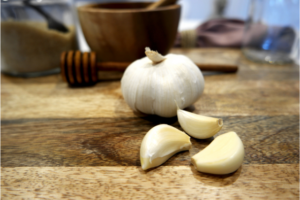
Garlic is a typical food that can help lower your blood sugar levels. Garlic cloves contain allicin, which helps regulate the breakdown of glycogen and glucose in your body. It also helps to improve your immunity and has anti-inflammatory properties.
Garlic cloves are just one way to lower blood sugar levels naturally. You should add other foods to your diets, such as green tea, apples, honey, seaweed, and black pepper. These foods affect your body to control insulin and blood sugar levels better.
10. Vinegar Or Coconut Oil
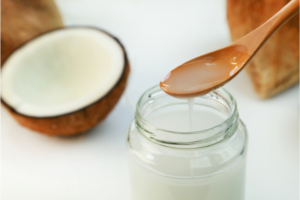
Eating vinegar or coconut oil can help regulate your blood sugar levels, increase insulin sensitivity and promote weight loss.
Vinegar and coconut oil contain resistant starch, which the body cannot digest. When this starch reaches the colon, it ferments and produces short-chain fatty acids like butyrate, acetate, and propionate.
These acids can lower your blood sugar levels by slowing down the release of sugars into your bloodstream, encouraging healthy gut bacteria.
Consuming these oils may also provide nutrients that are hard to get from other sources, such as copper, selenium, and zinc.
The Right Diet For Lowering Blood Sugar Levels

Eating the proper diet can be helpful when it comes to lowering blood sugar levels. Did you know that eating whole grains can also help with blood sugar control? When your body digests whole grains, it produces less insulin, which helps blood sugar regulation.
It might sound complex, but there are plenty of ways to incorporate healthy whole grains into your daily diet. For example, try adding oatmeal, quinoa, or brown rice to your morning cereal or eat a sandwich on whole-wheat bread.
Helpful Lifestyle Tips To Lowering Blood Sugar Levels
- Change Your Medication Routine

Regularly check whether you’re taking the proper medications for your condition at the correct times of the day. Make sure that you’re not missing any pills —if you take medications, schedule them, so they don’t conflict with one another.
For instance, insulin and sulfonylurea should never be taken within two hours of each other because they can cancel out each other’s effects. Also, ensure that your insulin (if applicable) and oral diabetes drugs aren’t causing low blood sugar.
- Eat A Healthy Diet

Healthy eating, as always, is key to regulating one’s blood sugar levels. This means that you should eat whole foods and limit your intake of processed carbohydrates, such as white bread or crackers.
You also shouldn’t skip meals; if you’re not hungry when it’s time for breakfast, have a small snack instead. Make sure that there are healthy snacks on hand at all times–nuts and dried fruit make excellent choices since they won’t raise blood glucose even though they contain a lot of simple carbs. Pay attention to your portion sizes!
- Stay Active
Physical activity can help keep insulin levels stable and prevent the drop in blood glucose symptomatic of low energy levels. Try going for walks during breaks from work, parking further away from your destination to get in extra steps, or taking dance breaks during TV.
- Take Care Of Yourself
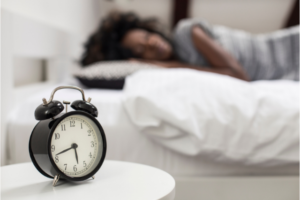
If you’re stressed, worried, or emotionally upset, you might see symptoms related to low blood glucose levels crop up. It’s crucial to reduce stress and be mindful of how you’re feeling overall–this will improve both health and mood.
Get enough sleep at night (eight hours before midnight is best), and don’t skimp on it just because you think you’ll have more energy if you stay awake. If necessary, take a quick nap during the day so that your body can recharge its batteries.
- Keep Blood Sugar Levels Under Control
This is easier said than done! There are essentially two methods of controlling blood sugar levels: food and medication. If you have type 1 diabetes, insulin injections are necessary to bring down high levels.
In type 2 diabetes, eating fewer processed carbohydrates is crucial in keeping healthy blood sugar levels–this will ensure that your body can produce enough insulin on its own without needing medications.
- Have A Plan For Low Blood Sugar Episodes

Always keep something easily digestible nearby if you start to experience symptoms related to low blood sugar. Make sure there’s a fruit or some candy near your bed so that if you wake up at night and feel funny, you’ll be able to get the nutrients you need quickly (however, don’t eat right before bed if possible; wait two hours after eating).
If you’re going to be in a place where low blood sugar spikes might arise (such as air travel), it’s a good idea to bring a backup supply of food and medicine so you don’t find yourself in a sticky situation.
Conclusion
By incorporating these foods into your daily diet, you may start to see a difference in how often you need insulin injections or diabetes medication. Always tune in to your body to prepare yourself if you suddenly need to modify your lifestyle. Following these tips will help keep your blood sugar levels more stable.

